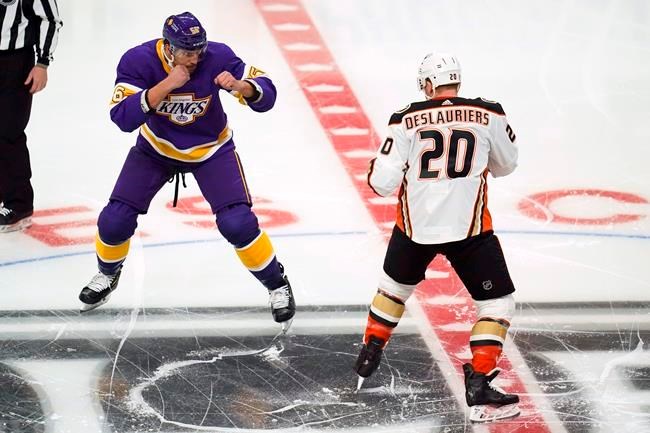It turns out Saturday night was all right for fighting between Arizona and St. Louis. Monday night, too.
Coyotes and Blues players dropped the gloves in both games, which were the third and fourth consecutive against each other. They will play three more times in four days — that's right, seven games in a row, like a playoff series that goes the distance, and a regular-season first for the NHL.
Tensions will continue to rise.
“If you’re going to play a team seven times in a row, it’s going to happen,” Coyotes forward Conor Garland said. “You’re going to have individual battles and then team battles. It’s hockey. It’s just the way it goes.”
Especially this season, when the NHL cooked up four new divisions and scheduled all regular-season games within those divisions. That set up miniseries of anywhere from two to five games, with the NHL trying to limit travel in a bid to stem the spread of the coronavirus. Seven chapters of Coyotes-Blues is an anomaly caused by scheduling changes forced by the pandemic.
Animosity is clearly up around the league with players seeing the same familiar, aggravating faces over and over again. There have been 37 fights already this season, and only two of the league's 31 teams haven't had at least one.
“There’s a little bit of bad blood that goes on between games,” Tampa Bay's Anthony Cirelli said after a game against Nashville that featured 32 penalty minutes. "The more and more we play teams, the emotions are high and these are the fun ones to play in because it kind of replicates that playoff kind of hockey.”
It's not a perfect comparison. As Blues winger David Perron said, “There’s not a Cup on the line” and Lord Stanley's trophy is far in the distance with the NHL just a quarter of the way through a shortened, 56-game regular season.
But the divisional schedule also means each game and point earned or lost is more important. It's direct competition in the eight-team U.S. divisions and seven-team Canadian division for four playoff spots each, which leads to what Winnipeg forward Adam Lowry called “a little more chippiness.”
“Just the battles I think get a little more intense, especially as it goes along,” Lowry said. “If you can get a couple games up on the other team, they’re that much more desperate.”
The Blues know how that feels. They've lost three of the first four against the Coyotes, including allowing a tying goal with 0.7 seconds left in regulation and getting beat in a shootout in the most recent meeting.
Asked if he's tired of facing the Coyotes, Blues coach Craig Berube said, “I'm tired of losing to them.” Same for Vancouver, which was swept in its last two “series” — two against Montreal and three against Toronto. Those games got increasingly heated.
“It’s competitive and it’s intense,” Canucks rookie Adam Gaudette said. “It’s a lot of fun playing in these important, competitive games. Every series means something. That’s the way it’s going to be all year.”
A couple of title-winning coaches, Washington's Peter Laviolette Columbus' John Tortorella, haven't noticed their games getting out of control yet. Edmonton's Zach Kassian described it early on as a “feeling out process” between division rivals and expects it to be a slow build from now through May.
Of course, certain events in games can cause spikes of hatred.
The Canadiens were none too pleased with a hit by Canucks
"Shots that happened to Bozy or other guys like that, sometimes that can carry over," Perron said.
Arizona coach Rick Tocchet said he sees a carryover from one game to the next against the same opponent, just like a playoff series. The roller coaster ride also shakes up emotions.
“One team’s happy, one team’s unhappy,” Tocchet said. “The team that’s happy, can you stay even keel in the moment? And the team that’s pissed, are they going to do something about it? That’s really why the chippiness comes out.”
Nashville and Tampa Bay weren't even in the same conference until this season, but that didn't stop them from combining for 60 penalty minutes in back-to-back games. Arizona and St. Louis didn't play much in previous years either, but it's fair to call it a rivalry, even if it ends up being temporary.
“It’s like anything,” Garland said. “You spend time around somebody too long, you get aggravated with them, and you play someone seven times, you’ll get aggravated with them, too.”
___
AP Sports Writer Teresa M. Walker contributed to this report.
___
More AP NHL: https://apnews.com/hub/NHL and https://twitter.com/AP_Sports
Stephen Whyno, The Associated Press


